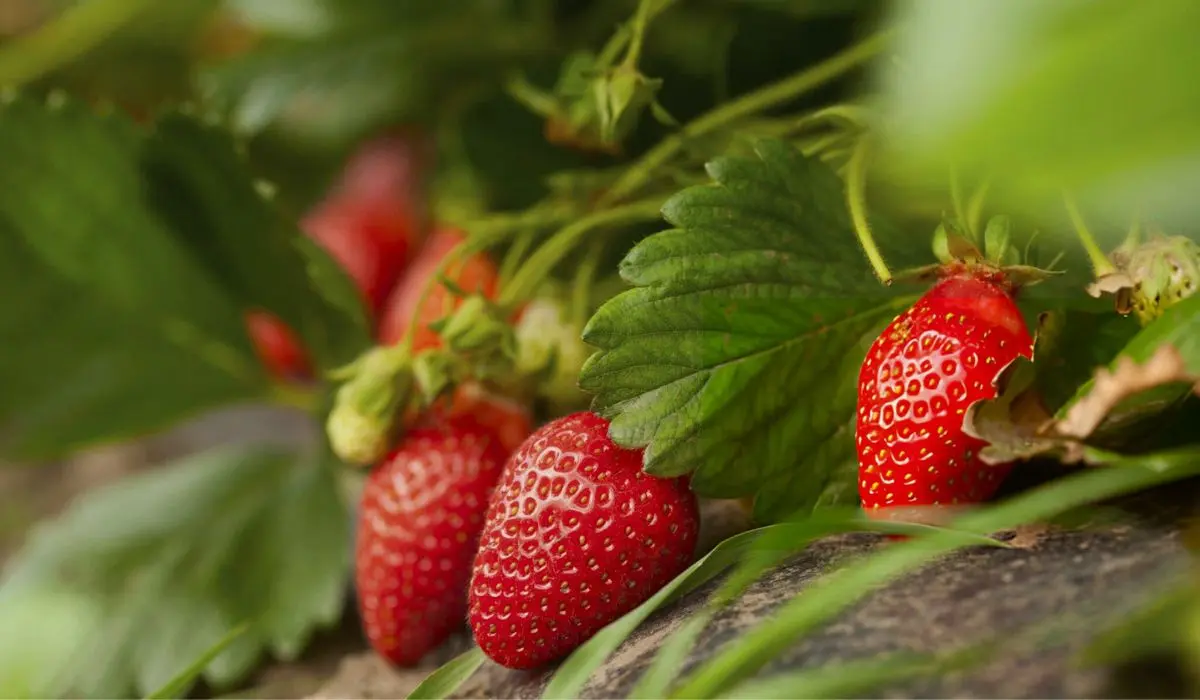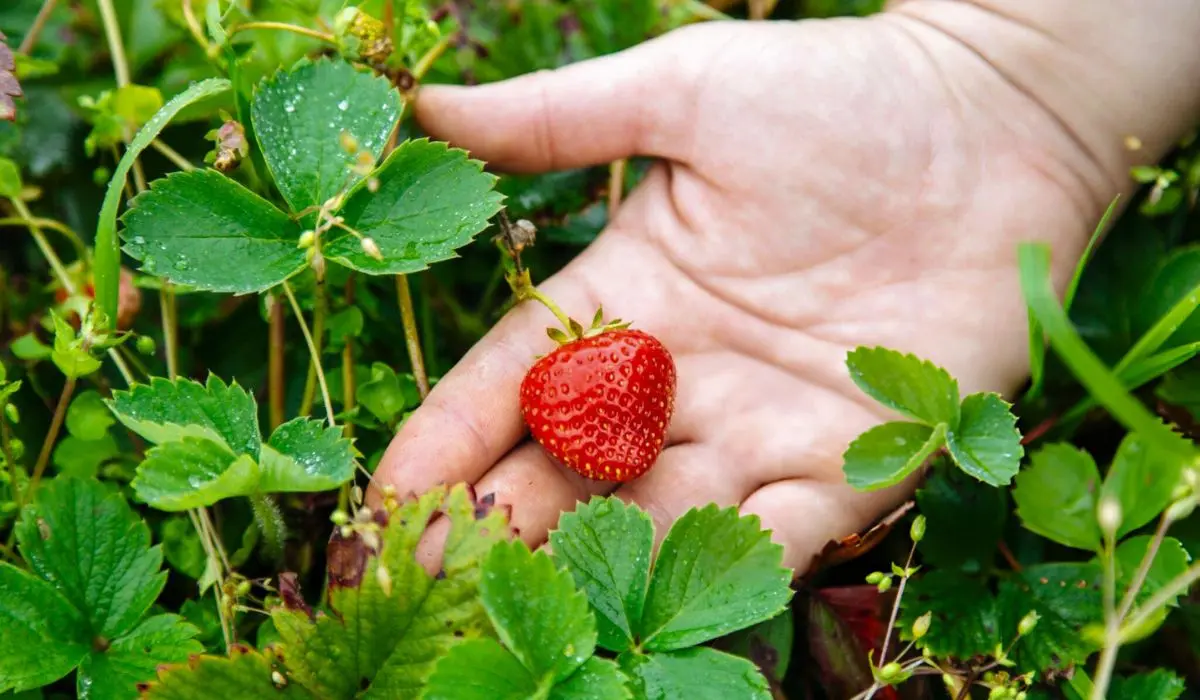When you think of strawberries, visions of plump, juicy red berries likely come to mind. However, there’s an unsung hero in the strawberry patch that often gets overlooked – the leaves! Yes, those green fronds that prop up the prized fruit are more than just decoration.
Strawberry leaves offer a treasure trove of health benefits that might make you think twice before tossing them aside.
From boosting immunity to aiding digestion, these humble greens pack a nutrient-rich punch that’s worth exploring. So, let’s delve into the world of strawberry leaves and uncover their surprising superpowers!
What Are Strawberry Leaves?
Before we dive into the benefits, let’s first understand what strawberry leaves are. As the name suggests, these leaves sprout from the strawberry plant, providing a lush, verdant canopy for the beloved berries to grow.
While the fruit steals the spotlight, the leaves have been quietly harboring an array of essential vitamins, minerals, and plant compounds that can contribute to our overall well-being.

Factors That Include Nutritional and Medicinal Properties:
Strawberry leaves are a nutritional powerhouse, brimming with an impressive array of vitamins and minerals. They are particularly rich in vitamin C, vitamin A, calcium, iron, and magnesium – all essential nutrients that play vital roles in our body’s functions.
Additionally, these leaves contain potent antioxidants, including flavonoids and phenolic compounds, which help combat free radicals and reduce oxidative stress.
Moreover, strawberry leaves possess remarkable medicinal properties. They have been used in traditional medicine for centuries, valued for their anti-inflammatory and diuretic abilities.
Their anti-inflammatory compounds can help alleviate conditions associated with chronic inflammation, such as arthritis, while their diuretic properties can aid in promoting fluid balance within the body.
Key Benefits Of Strawberry Leaves
1. Immune System Boost
With their rich vitamin C content, strawberry leaves can be a valuable ally in strengthening your immune defenses.
Vitamin C is a potent antioxidant that supports the body’s ability to fight off infections and illnesses, making strawberry leaves a natural immune booster.
2. Antioxidant Protection
The abundance of antioxidants found in strawberry leaves, including flavonoids and phenolic compounds, can help neutralize free radicals and protect your cells from oxidative damage.
This, in turn, may reduce the risk of various chronic diseases, such as cancer, heart disease, and premature aging.
3. Anti-Inflammatory Properties
If you struggle with chronic inflammation, strawberry leaves may offer relief. Their anti-inflammatory compounds can help mitigate inflammation in the body, potentially alleviating symptoms associated with conditions like arthritis, gout, and even certain skin disorders.
4. Digestive Aid
Strawberry leaves have long been valued for their ability to promote healthy digestion. They can stimulate the production of digestive enzymes, facilitate the breakdown of food, and even act as a natural laxative, helping to alleviate constipation and promote regular bowel movements.
5. Diuretic Effect
Thanks to their diuretic properties, strawberry leaves can help promote fluid balance in the body by increasing urine output. This can be particularly beneficial for those struggling with water retention or certain kidney-related issues.
6. Rich In Fiber
In addition to their other nutritional benefits, strawberry leaves are a good source of fiber. Dietary fiber plays a crucial role in maintaining a healthy digestive system, regulating blood sugar levels, and even supporting weight management efforts by promoting feelings of fullness.
7. Culinary Versatility
Beyond their health benefits, strawberry leaves offer a unique culinary experience. Their earthy, slightly sweet flavor can be incorporated into salads, smoothies, pesto, or even used as a garnish for cocktails or baked goods. Experimenting with these leaves in the kitchen can add both flavor and nutrition to your dishes.
Conclusion
While we often overlook the humble strawberry leaves in favor of their sweeter, more vibrant counterparts, these unassuming greens deserve our attention.
Packed with vitamins, minerals, antioxidants, and anti-inflammatory compounds, strawberry leaves offer a wealth of health benefits that can contribute to overall well-being. From boosting immunity to aiding digestion, these versatile leaves have the potential to become a valuable addition to your diet.
FAQs
Yes, strawberry leaves are generally considered safe for consumption. However, it’s important to wash them thoroughly and start with a small amount, especially if you’re trying them for the first time, as some individuals may experience allergic reactions.
Absolutely! Strawberry leaves can be enjoyed raw in salads, smoothies, or as a garnish. Their fresh, slightly earthy flavor can add a unique dimension to your dishes.
Strawberry leaves have a fresh, herbaceous taste with a hint of sweetness and an earthy undertone. Their flavor is often described as slightly reminiscent of the strawberry fruit itself but with a more pronounced green, leafy essence.
Yes, strawberry leaves can be used to make a refreshing and nutrient-rich tea. Simply steep the fresh or dried leaves in hot water, and enjoy their earthy, slightly sweet flavor.
While strawberry leaves are generally safe for most people, some individuals may experience allergic reactions, such as hives, itching, tingling around the mouth, or breathing difficulties. If you notice any adverse effects, discontinue consumption and seek medical advice.
References
- NIH (n.d) Biological Potential of Fruit and Leaves of Strawberry Tree (Arbutus unedo L.) from Croatia Available Online at: https://www.ncbi.nlm.nih.gov/pmc/articles/PMC7663455/
- Queensland Government (1995-2024) Strawberry angular leaf spot Available Online at: https://www.business.qld.gov.au/industries/farms-fishing-forestry/agriculture/biosecurity/plants/priority-pest-disease/angular-leaf-spot







